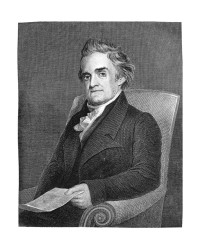
Over the next several posts via a series of vignettes, I will introduce several influential educators in American history. Some of these individuals have familiar names while others, though important, have long been forgotten. Considering the foundational role Noah Webster played in early American education, and that he serves as the namesake of Noah Webster Educational Foundation, it is fitting that we begin this project by identifying and examining several of his many contributions to American education and the new nation at large.
Noah Webster was the son of a New England farmer and weaver. He was born in 1758 and grew up in Connecticut. Though not from a wealthy family, his father saw that he was able to go to Yale College by mortgaging the family farm. Webster originally studied law but chose instead to embark on a career as a teacher. Coming of age during a time of great conflict between the American colonies and the mother country, what he saw and experienced while maturing into a young adult profoundly influenced his thinking and helped shape his adult life.
Even after Independence was declared, the new United States remained largely separated by regional and cultural differences. The people who had settled up and down the Eastern shore of North America had come from different parts of the British Isles and beyond. While they shared common values, still many differences existed among them. Webster had a deep interest in unifying the various sub-cultures of the former thirteen separate British North American colonies into a national unity. It was his desire to create a distinct American identity. Since having a common language is one of the identifying factors in the making of a nation, his contributions in this area were without equal.
As an adult Webster became a Christian during the Second Great Awakening of the late 18th century. His Christian faith was not separated from the warp and woof of life and culture. He considered “education useless without the Bible.” He said, “no truth is more evident to my mind than that the Christian religion must be the basis of any government intended to secure the rights and privileges of a free people….” Regarding the liberty won through independence from the British Crown, he said, “the religion which has introduced civil liberty is the religion of Christ and His apostles, which enjoins humility, piety, and benevolence; which acknowledges in every person a brother, or a sister, and a citizen with equal rights. This is genuine Christianity, and to this we owe our free Constitutions of Government.”
Webster’s contributions toward blending the divergent American sub-groups into a national whole are legend. That is in part why he has been called the ‘Founding Father of American Scholarship and Education.’ Among his many contributions is his role as an early textbook author. In 1783, he published, A Grammatical Institute of the English Language, popularly known as the Blue-Backed Speller. As a young schoolteacher he did not think it appropriate that the grammar book in use in the young Republic came from England and praised the British monarch. Since the once revered George III had turned his back on his former loyal colonial subjects, Webster did not want the next generation of the new United States being taught to venerate their former King.
The speller Webster authored was used by American school-children for over 100 years teaching them to read, spell, and adopt a common pronunciation of words. Webster was a nationalist and an American first. As such he transformed the King’s English into American English, unifying the language Americans wrote and spoke by simplifying the spelling of English words such as ‘musick’ and ‘colour’ to ‘music’ and ‘color,’ and changing the ‘re’ ending of words to ‘er,’ for example the word ‘centre’ became ‘center.’ In addition to teaching, writing textbooks, co-founding Amherst College, editing newspapers and magazines, among many other things, he spent a major portion of his adult life working as a lexicographer. In 1801 he undertook the writing of the first American dictionary of the English language, which he published in 1806. This was only the beginning as he continued this line of work producing a complete dictionary containing some 70,000 word definitions and pronunciations in 1828. To help him complete this project he at the same time began to study and learn some 26 languages so as to better define the meaning and etiology of English words.
Reprints of Noah Webster’s American Dictionary of the English Language are still available today and make a fine addition to any families’ library. Unfortunately, the noble and right-standing basis for educating the children of the new Republic that he proposed and helped implement came under attack and were subsequently undermined in the years following his death. Honoring Noah Webster by incorporating his name in the title of the Noah Webster Educational Foundation is evidence the Foundation believes he stands head and shoulders above all other American educators.
This is the inaugural post in our education history series. This series will examine key figures and events in education and their lasting influence. Examining the journey of education that brought us to the present day helps us to learn from the lessons of the past to create a better today for our children.




